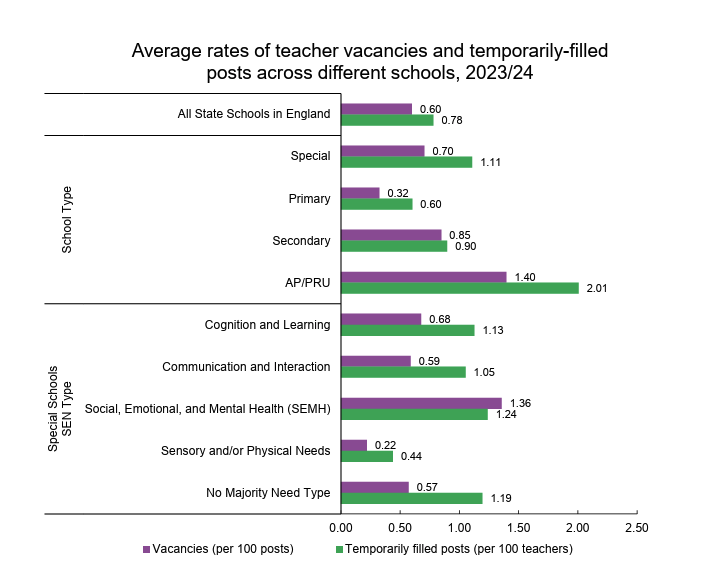Government data appears to under-state the extent of teacher vacancies in alternative provision because it combines data with that of special schools, a new report has warned.
The National Foundation for Educational Research called on the government to report separately the vacancy rate for special and AP schools in its national workforce statistics, which are published annually.
The latest figures show state-funded special schools and pupil referral units (PRUs) had an average vacancy rate of 0.8 per cent – or 0.8 per 100 posts – higher than the total figure for all state-funded schools of 0.6.
But analysis of school-level data by the NFER found that special schools “have a substantially lower rate of teacher vacancies, on average, than PRUs and other forms of alternative provision”.
In fact, the average vacancy rate is twice as high in AP (1.4 per cent) than in special schools (0.7 per cent).
“Whilst this does not mean the vacancy rate in special schools is low (it is similar to secondary schools, where recruitment has been challenging in recent years), the statistics appear to overstate special school vacancies and understate AP vacancies by grouping these schools together.”
The DfE should therefore separate out special schools and alternative provision in school workforce statistics, as the existing statistics “conflate these settings in a way that masks differences between them”.

TA vacancy data needed too, says report
The report also calls on the government to collect teaching assistant vacancy data and always fully-fund special schools for support staff pay rises because they are more “vulnerable” to staff and funding pressures.
Special schools have, on average, fewer pupils than primary schools, but “considerably more staff”, in part because of their reliance on TAs. The average special school has 41 TAs, compared to 11 in primaries and 14 in secondaries.
This leaves special schools “likely to be particularly affected by teaching assistant shortages”, though these are “hard to measure given existing data”.
The DfE does not collect or publish vacancy rates for teaching assistants like it does for teachers.
Surveys suggest special schools struggle more with support staff recruitment.
In 2023, NFER found 63 per cent of senior leaders from special schools found recruiting teaching assistants “very difficult”, compared to 51 per cent and 55 per cent in primary and secondary schools.
The report said the government should “start measuring teaching assistant vacancy rates in schools as part of the annual school workforce census”.
This would be a “crucial step in helping understand the national shortage of teaching assistants and scale of the policy solutions, including on pay, that are required to help.
“It is also likely to be more important to mainstream schools in future too, given the increased numbers of children with SEND in those settings.”
Special schools more vulnerable to funding pressures
Special schools’ reliance on TAs also leaves them “vulnerable to funding pressures when the government provides additional funding for pay rises for teachers, but not support staff”.
School spending data shows support staff made up 33 per cent of all spending in special schools in 2023-24, compared to 19 per cent across all schools.
The government “has not always announced additional funding for schools when teaching assistants have received pay increases.
“This risks putting pressure on all schools, but special schools are particularly vulnerable because a larger proportion of their budget is determined by teacher assistant pay.”
The report acknowledged the latest increase in funding “did also provide additional funding (to the average school) for support staff”.
This arrangement “should continue in future to ensure special schools do not experience additional funding pressures linked to pay increases”.















Your thoughts